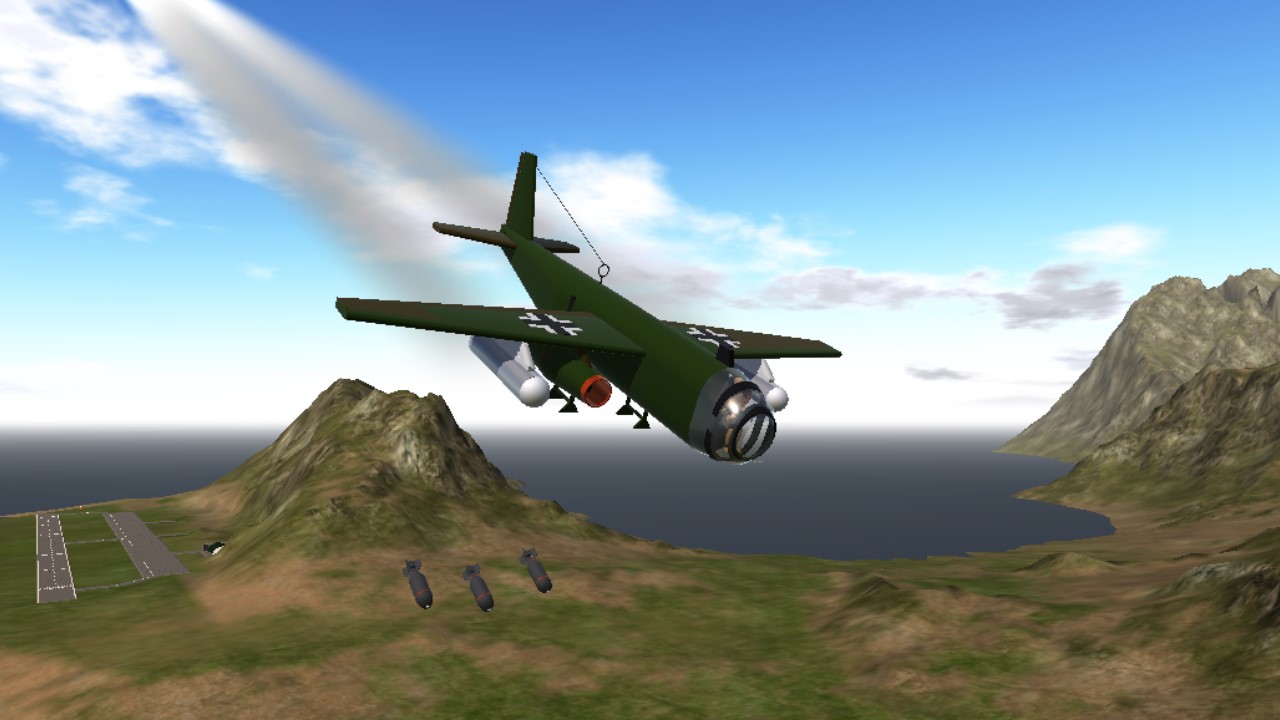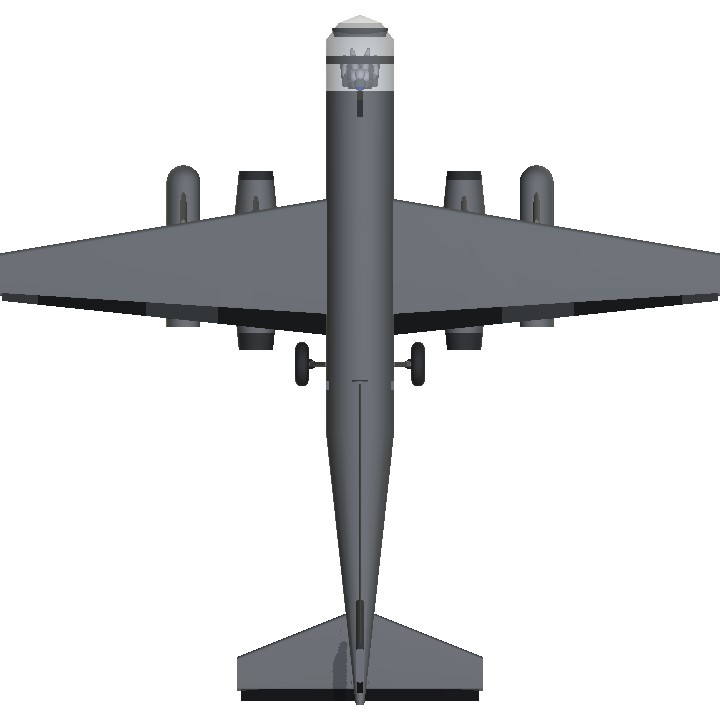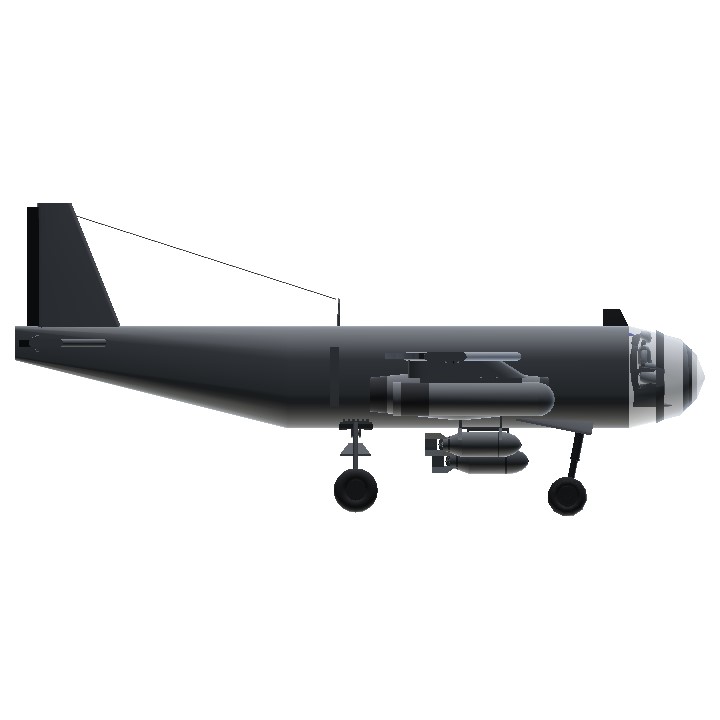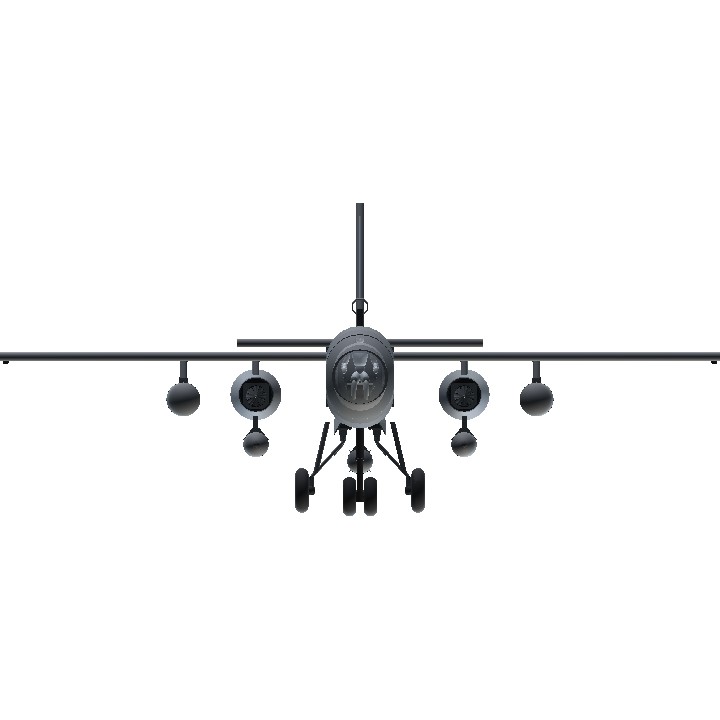Auto Credit Based on Default4's Arado Ar 234 B-2 Blitz JATO
Arado
Ar 234 B-2 "Blitz" (JATO Rockets)
[Late war, German WWII Jet bomber and Arado E.381 Platform]
[Credit to IStoleYourMeme, CobraHueyIndustries, Grogu, and BogdanX]
Controls
VTOL - Flaps
Trim - Trimming
AG1 - Jettison JATO Rockets
AG2 - Activate JATO Rockets
AG3 - Jettison bomb load
AG4 - Drogue Chute
AG5 - Activate Engines (VERY IMPORTANT !!)




Features
- 188 Parts
- Iron Cross insignia for wing, excluded Swastika to kill the evil vibes
- JATO Rockets (They work, trust me)
- Full bomb load (Credit to BogdanX)
- Glass cockpit
Very mobile friendly
Need I say more?Tutorial for JATO
- Activate engine with AG5. Throttle up.
- Lower flaps down, VTOL Down.
- Press AG2, activates the rockets.
- Get off the ground to at least ~1500-2000 Feet.
- Retract your gear. Press AG1 and Jettison JATO rockets. Now go bomb something...
Specifications
General Characteristics
- Predecessor Arado Ar 234 B-2 Blitz JATO
- Created On Android
- Wingspan 34.6ft (10.6m)
- Length 33.2ft (10.1m)
- Height 15.1ft (4.6m)
- Empty Weight 12,979lbs (5,887kg)
- Loaded Weight 19,252lbs (8,732kg)
Performance
- Power/Weight Ratio 1.517
- Wing Loading 58.3lbs/ft2 (284.4kg/m2)
- Wing Area 330.5ft2 (30.7m2)
- Drag Points 5121
Parts
- Number of Parts 188
- Control Surfaces 7
- Performance Cost 794





ALL TAGS WERE REQUESTED!
@Thegrandwosh I took these off a really old build of mine, I really have no memory of how theyre built :( if you want you can tear it apart and look at it for yourself
@Thegrandwosh Detachers were used, so they just activate and detach whenever I want. Also theyre infernos, not rockets.
@KnightOfRen it is the almighty, holy, E
@IMAFISH42069
?
i cant read that
𝓮
Ok. Sorry! It’s nice to have you back! I missed you in the comments section talking to @Tristar and @Hedero @KnightOfRen
discord drama @CaptainRex123
@CaptainRex123
Its irrelevant drama that I cannot discuss here. The important thing is that I'm back
I need to know, im nosy why were u banned?
@BagelPlane
Imma do it after checking my notifications
Did you put up a new bio or sorts?
@xboxseriesx
You said that already
I saw you on tv your famous
Link
@Planeacceleration
I didnt get a notification. Link?
@KnightOfRen
Did you ever see my tag?
@SimplyPlain
Much appreciated. Glad its a fun one!
Very fun plane, this! Not really an Ar-234 though, but that's easy to forgive.
@KnightOfRen Second gen fighters are the best...
I know I do be lookin' frosty@KnightOfRen
Smart, have jettison rockets before activate them. Cool plne thoo
@tsampoy
Second-generation jet fighters are jet fighter aircraft that were developed between the mid-1950s and the early 1960s.
The development of second-generation fighters was shaped by technological breakthroughs, lessons learned from the aerial battles of the Korean War, and a focus on conducting operations in a nuclear warfare environment. Technological advances in aerodynamics, propulsion and aerospace building materials (primarily aluminum alloys) permitted designers to experiment with aeronautical innovations, such as swept wings, delta wings, and area-ruled fuselages. Widespread use of after-burning turbojet engines made these the first production aircraft to break the sound barrier, and the ability to sustain supersonic speeds in level flight became a common capability amongst fighters of this generation.
Fighter designs also took advantage of new electronics technologies that made effective radars small enough to be carried aboard smaller aircraft. Onboard radars permitted detection of enemy aircraft beyond visual range, thereby improving the handoff of targets by longer-ranged ground-based warning and tracking radars. Similarly, advances in guided missile development allowed air-to-air missiles to begin supplementing the gun as the primary offensive weapon for the first time in fighter history. During this period, passive Infrared homing became commonplace, but early IR missile sensors had poor sensitivity and a very narrow field of view (typically no more than 30°), which limited their effective use to only close-range, tail-chase engagements. Radar-guided (RF) missiles were introduced as well, but early examples proved unreliable. These semi-active radar homing (SARH) missiles could track and intercept an enemy aircraft "painted" by the launching aircraft's onboard radar. Medium- and long-range RF air-to-air missiles promised to open up a new dimension of "beyond-visual-range" (BVR) combat, and much effort was placed in further development of this technology.
Pretty good
@Hedero
69K bro